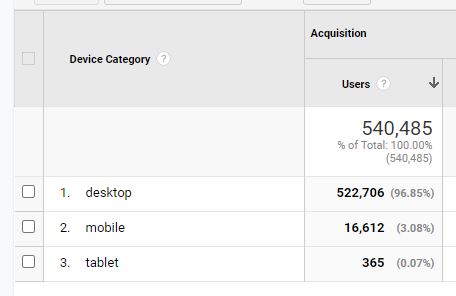Are Mobile-Friendly Websites *Actually* Still Important in 2024?

If you’ve spent more than 20 seconds researching website design ideas or search engine optimization (SEO) tips, you’ve probably stumbled across quite a few blogs and articles talking about the importance of “mobile-friendliness” and “responsive design”.
The gist of the prevailing theory over the last 8-10 years:
(a) more and more users are visiting websites on their mobile devices, therefore;
(b) websites should cater to these mobile users by designing websites with a “mobile first” perspective.
We largely have adopted this perspective as an agency and have held this as our perspective in sales calls, design meetings, and website development sessions.
But is this actually still important going into 2024?
Three considerations:
Design for mobile, but don’t ignore desktop
Desktop and laptop devices are still used, especially in business settings. I am writing this blog post on a laptop that I use every day for agency work. 80%+ of my search engine searches are done on this laptop.
Obviously, I am in a different position than others who work different types of jobs. But, there is a significant subset of people like myself that find desktop devices to be superior to mobile devices for surfing the web.
Why? Using a website on a desktop device is a better user experience. It’s easier to navigate. It’s easier to see the context of an entire page. Navigation menus make more sense. You can have precision in clicking with a mouse.
The web design industry has taken steps to make the mobile UX experience more intuitive, but it remains less ideal than desktop.
Make sure in the process of designing for mobile, that you don’t ignore the desktop experience.
Get data on device type your target customer is using
The discussion about mobile friendliness is always strewn with data on how many users are using mobile devices over desktop devices. They will often cite statistics, post data, etc.
We see this data in our clients’ Google Analytics too. It’s real. Many people use mobile devices to view and find our websites.
But some industries see WAY more desktop traffic than mobile traffic. These industries are generally B2B, manufacturing, parts, etc. where the user is likely in a work environment and doing research for work purposes.
If you already have a website and have Google Analytics hooked up, you can view this under Reports > User > Tech > Overview. It will give you a breakdown of desktop vs. tablet vs. mobile.
Here is a screenshot from a client who is in the B2B space. This is looking at traffic from 2022 and most of 2023:

Of the 540,485 users, 96.85% viewed the website on desktop. 3.08% viewed the site on mobile. 0.07% viewed it on a tablet.
Is this an outlier? To some extent. But it underscores my point: check your analytics to see what devices YOUR users are using.
A very sizable chunk of users still prefer the desktop experience. So why should we completely ignore these users?
Mobile-first but never mobile-only
Google drives 90%+ of web traffic on the internet. Google’s documentation explicitly says they use “mobile-first indexing” in their search engine algorithm.
So, we design for mobile. Simple as.
But we know there ARE users who use desktop. We see this in our analytics every day. These users should have a great experience navigating our sites on their laptops and desktops. There are even significant design advantages: we can use full-size images, play with dynamic horizontal spacing, create hover effects, etc. We try to take advantage of these when we can.
Bluestem Media’s design philosophy going into 2024 is still mobile-first by necessity, but will never be “mobile only”. Until desktop and laptop devices are completely obsolete in search, we will continue to make aesthetic websites to operate on both devices.
Wrapping things up
I didn’t want to pollute the internet with another blog post about the importance of mobile-friendliness. You know this if you’ve done any research at all. Instead, I want to underline the importance of mobile, while giving a counter-case to the prevailing industry wisdom.
Build for mobile, but don’t ignore desktop.
Isaac Wiinanen
Isaac is an SEO Strategist & Web Project Lead for Bluestem Media. Focused on local SEO, Google Business Profile optimization, and StoryBrand marketing.




